The Diary of Robert Walker of Richmond, 1815 - 1890
Diary Extracts Part 3 1878 - 1889
Word Search this page: - PC: Control+F - Mac: Command+F
1878. December 24th
Measles raging in Peterhead, fifteen children buried in one day.
Daily Free Press, Wednesday, December 25th, 1878:
Peterhead - The Saturday mails were brought from New Maud yesterday by two men who rode on horseback from Peterhead yesterday morning. The weather is still intensely cold but snow has ceased to fall. We have had no train since Saturday and are still secluded from the outer world.
Sir, I am surprised Aberdeen seems unable to cope with the present snow storm. All over the Continent cabs and 'buses are put on runners kept for the purpose. I mentioned this to a cab man the other day and he replied - "I wish we could get it done, sir." We are only at the beginning of winter and I don't think that even Aberdonian caution would find the above a losing thing. Once made, the runners are good for succeeding winters. As for the condition of the street pavements, I wonder the inhabitants don't pitch into the authorities. There are hundreds of idle men loafing at street corners cracking with the police.
1880. February 28th
"Hope" and "Windward" sailed.
The voyage of the "Hope" in 1880 was quite remarkable. . . .
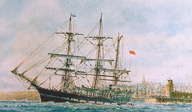 It was customary for qualifying medical students
to spend the last year of their course as a ship's doctor. For that season
Captain John Gray signed a young man from Edinburgh by the name of Arthur
Conan-Doyle. Many who have studied the life and times of the author agree
that it was his "Arctic Adventure" that would eventually persuade
Doyle to leave the medical profession and take up the pen. His experience
aboard the Hope is strongly reflected in such works as The Little Square
Box and The Captain of the Pole Star.
It was customary for qualifying medical students
to spend the last year of their course as a ship's doctor. For that season
Captain John Gray signed a young man from Edinburgh by the name of Arthur
Conan-Doyle. Many who have studied the life and times of the author agree
that it was his "Arctic Adventure" that would eventually persuade
Doyle to leave the medical profession and take up the pen. His experience
aboard the Hope is strongly reflected in such works as The Little Square
Box and The Captain of the Pole Star.
In his memoirs Conan-Doyle wrote of his voyage: "I should have found it intolerable if the captain had been a bad fellow, but John Gray was a really splendid man, a grand seaman and a serious minded Scot, so that 'I found a comradeship which was never marred during our long tête-à-tête."
During his voyage Conan-Doyle fell into the sea no less than three times. The crew nicknamed the doctor "The Great Northern Diver."
Image: ss "Hope" Leaving Peterhead North Harbour
W. Hutton c1880 courtesy Arbuthnot Museum
1880. September 4th
This has been the greatest herring fishing that has ever been in Peterhead.
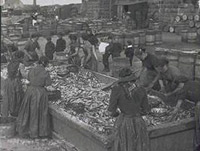 The East Aberdeenshire Observer, Tuesday 31st August
1880:
The East Aberdeenshire Observer, Tuesday 31st August
1880:
Peterhead: Such has been the success that generally at several
of the ports the fishing is very nearly finished. The season's average
now shows an increase of over 140 crans over that at the same time last
year.
Fraserburgh: There is scarcely a boat fishing here this season but what
has turned the hundred crans, and there are a large number who never had
their compliments in their lives before. During the last week 38 cargoes
of herrings have left for the Continent.
Daily Free Press, Monday September 6th 1880:
The season has had unprecedented
success all along the coast and a most bountiful harvest of fish has been
reaped from Arbroath to Lerwick.
Peterhead: 608 boats; total of 140,418 crans.
Fraserburgh: 780 boats; total of 195,413 crans.
The total for the Scottish herring fishing that season was an estimated 700,000 crans.
Image:Gutters at the Farlane. A Greenhill curing yard, Keith Inch, Peterhead
c1900.
Throughout the boom years of the 19th and early 20th century, the land
based workforce - the "guttin' quines and cooper loons" played
as vital a role in the industry's success as the fishermen did at sea.
Courtesy Arbuthnot Museum
1880. October 1st
Mrs Gray's new house on the Links slated, the old one in Jamaica Street
sold.
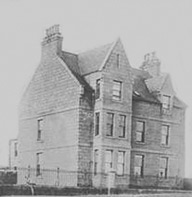 The Links was built as a family home for Captain David Gray, his wife
Amelia and their eleven children. Amelia Gray lived in the house for several
years after Gray's death in 1883 before selling it to local fish curer
John Sutherland, just after the First World War. Private donations helped
the Town Council buy The Links from the Sutherland family and the house
became the Cottage Hospital in 1938. The Links was demolished in 1991 to
make way for the new Peterhead Health Centre.
The Links was built as a family home for Captain David Gray, his wife
Amelia and their eleven children. Amelia Gray lived in the house for several
years after Gray's death in 1883 before selling it to local fish curer
John Sutherland, just after the First World War. Private donations helped
the Town Council buy The Links from the Sutherland family and the house
became the Cottage Hospital in 1938. The Links was demolished in 1991 to
make way for the new Peterhead Health Centre.
The Links, 1880 - 1991, as it looked in the 1920s
1882. June 22nd
The Hope gone in search of the Eira.
1882. August 20th
Return of the Hope with Mr Smith and the crew of the Eira from Franz Josephs
Land.
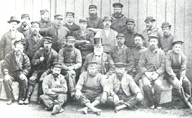 The "Eira" a steam exploration yacht built by Stephen and Forbes,
Peterhead, for Mr Leigh Smith, was on her second voyage to map the waters
around Novya Zembla when she was crushed in the ice. The crew survived
a severe Arctic winter living in a hut made from boat spars and eating
mainly walrus meat.
The "Eira" a steam exploration yacht built by Stephen and Forbes,
Peterhead, for Mr Leigh Smith, was on her second voyage to map the waters
around Novya Zembla when she was crushed in the ice. The crew survived
a severe Arctic winter living in a hut made from boat spars and eating
mainly walrus meat.
The crew of the rescue ship Ss "Hope"
expedition leader Sir William Young in top hat. Courtesy Arbuthnot Museum
In June 1882 the "Hope" was commissioned by the Geographical Society to go in search of the stricken crewmen. The ship was prepared for a whole year at sea but after only two months the crew were found and returned to Peterhead amid great celebration.
1883. March 17th
Heavy snow storm blowing hard N.E. The Mazinthien from Dundee to Greenland
wrecked in Peterhead Bay.
The famous ship's career came to an end when she was storm blown onto the rocks in Peterhead Bay, only a few hours from home, on her way north.
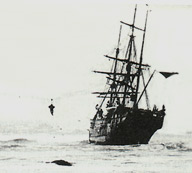 In
response to the ship's distress flares the local Coast Guard Volunteers,
under the supervision of a Mr Goode, managed to get a hawser over to the
ship from shore using a "rocket firing device." The ship's crew
improvised a cradle using ropes, blocks and planking and, though the operation
took several hours, they were all brought ashore unharmed.
In
response to the ship's distress flares the local Coast Guard Volunteers,
under the supervision of a Mr Goode, managed to get a hawser over to the
ship from shore using a "rocket firing device." The ship's crew
improvised a cradle using ropes, blocks and planking and, though the operation
took several hours, they were all brought ashore unharmed.
A crewman from the stricken ss "Mazinthien" is hauled ashore. Peterhead Bay, March 17th, 1883. Courtesy Arbuthnot Museum
The "Mazinthien" was a Canadian ship, built in New Brunswick and named in honour of a tribal chief. She first came to Peterhead in 1851 and was commanded by Capt. P. Burnett and later Capt. John Gray Jnr. Fitted with steam engines in 1866 she was sold to Dundee in 1873.
Walker's son John served as an officer aboard the Mazinthien in 1873.
1884. June 6th
Report by Commissioners in favour of Peterhead for a Harbour of Refuge.
The Harbour of Refuge In September 1858
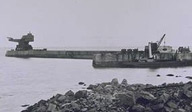 Walker first made mention of the
Harbour of Refuge when he noted a visit to Peterhead from the Harbour Commissioners.
The harbour board and maritime worthies of Peterhead eventually won over
competition from a number of other towns, including Aberdeen, to be the
site of a Harbour of Refuge for North Sea traffic. An act of Parliament
was passed in 1886 authorising planners and builders to proceed with the
mammoth task. With construction halts in both the first and second World
Wars, the work was not completed until the late 1950s. To cut costs, it
was decided that the labour should be undertaken by convicts and a prison
was erected nearby for that purpose. Their work was carried out under armed
guard, supervised by local masons and tradesmen.
Walker first made mention of the
Harbour of Refuge when he noted a visit to Peterhead from the Harbour Commissioners.
The harbour board and maritime worthies of Peterhead eventually won over
competition from a number of other towns, including Aberdeen, to be the
site of a Harbour of Refuge for North Sea traffic. An act of Parliament
was passed in 1886 authorising planners and builders to proceed with the
mammoth task. With construction halts in both the first and second World
Wars, the work was not completed until the late 1950s. To cut costs, it
was decided that the labour should be undertaken by convicts and a prison
was erected nearby for that purpose. Their work was carried out under armed
guard, supervised by local masons and tradesmen.
nefa 2000
Image: The mighty Titan crane at work on the South Breakwater, early 1900s. Courtesy Arbuthnot Museum
1888. September 3rd
The "Eclipse" from Greenland with 20 tons.
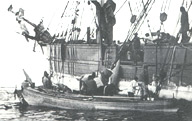 Along with the oil the "Eclipse" brought home an invaluable
cargo of photographs taken during the voyage. David Gray of the "Eclipse" took
with him as a Captain's guest Australian traveller and photographer Walter
Livingstone-Learmonth. During the voyage Learmonth took several photographs
of the ship and her crew as they went about their daily routines. This
unique photographic account of the whalers and their activities is kept
by the Natural History Museum Library, London.
Along with the oil the "Eclipse" brought home an invaluable
cargo of photographs taken during the voyage. David Gray of the "Eclipse" took
with him as a Captain's guest Australian traveller and photographer Walter
Livingstone-Learmonth. During the voyage Learmonth took several photographs
of the ship and her crew as they went about their daily routines. This
unique photographic account of the whalers and their activities is kept
by the Natural History Museum Library, London.
Image: A Greenland Whale alongside the "Eclipse", Greenland Sea, 1888. Courtesy Arbuthnot Museum
1889. December
John Died Portland Oregon, Dec. 1888.
The last entry in Robert Walker's Diary was this brief note of his son's death. A captain in the Merchant Navy, John died while his ship lay in Portland harbour.
In poor health, the diarist ceased to record his daily routines as 1889 came to a close. He died the following year.

